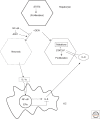NF-kappaB as a critical link between inflammation and cancer
- PMID: 20066113
- PMCID: PMC2773649
- DOI: 10.1101/cshperspect.a000141
NF-kappaB as a critical link between inflammation and cancer
Abstract
NF-kappaB transcription factors have been suspected to be involved in cancer development since their discovery because of their kinship with the v-Rel oncogene product. Subsequent work led to identification of oncogenic mutations that result in NF-kappaB activation in lymphoid malignancies, but most of these mutations affect upstream components of NF-kappaB signaling pathways, rather than NF-kappaB family members themselves. NF-kappaB activation has also been observed in many solid tumors, but so far no oncogenic mutations responsible for NF-kappaB activation in carcinomas have been identified. In such cancers, NF-kappaB activation is a result of underlying inflammation or the consequence of formation of an inflammatory microenvironment during malignant progression. Most importantly, through its ability to up-regulate the expression of tumor promoting cytokines, such as IL-6 or TNF-alpha, and survival genes, such as Bcl-X(L), NF-kappaB provides a critical link between inflammation and cancer.
Figures



Similar articles
-
NF-κB and the link between inflammation and cancer.Immunol Rev. 2012 Mar;246(1):379-400. doi: 10.1111/j.1600-065X.2012.01099.x. Immunol Rev. 2012. PMID: 22435567 Review.
-
Transforming growth factor-alpha inhibits the intrinsic pathway of c-Myc-induced apoptosis through activation of nuclear factor-kappaB in murine hepatocellular carcinomas.Mol Cancer Res. 2005 Jul;3(7):403-12. doi: 10.1158/1541-7786.MCR-04-0186. Mol Cancer Res. 2005. PMID: 16046551
-
X-linked inhibitor of apoptosis (XIAP) inhibits c-Jun N-terminal kinase 1 (JNK1) activation by transforming growth factor beta1 (TGF-beta1) through ubiquitin-mediated proteosomal degradation of the TGF-beta1-activated kinase 1 (TAK1).J Biol Chem. 2005 Nov 18;280(46):38599-608. doi: 10.1074/jbc.M505671200. Epub 2005 Sep 12. J Biol Chem. 2005. PMID: 16157589
-
Regulation of alpha-fetoprotein by nuclear factor-kappaB protects hepatocytes from tumor necrosis factor-alpha cytotoxicity during fetal liver development and hepatic oncogenesis.Cancer Res. 2004 Oct 1;64(19):7030-8. doi: 10.1158/0008-5472.CAN-04-1647. Cancer Res. 2004. PMID: 15466196
-
Dangerous liaisons: STAT3 and NF-kappaB collaboration and crosstalk in cancer.Cytokine Growth Factor Rev. 2010 Feb;21(1):11-9. doi: 10.1016/j.cytogfr.2009.11.005. Epub 2009 Dec 16. Cytokine Growth Factor Rev. 2010. PMID: 20018552 Free PMC article. Review.
Cited by
-
COMMD7 is correlated with a novel NF-κB positive feedback loop in hepatocellular carcinoma.Oncotarget. 2016 May 31;7(22):32774-84. doi: 10.18632/oncotarget.9047. Oncotarget. 2016. PMID: 27129158 Free PMC article.
-
p53 and the Carcinogenicity of Chronic Inflammation.Cold Spring Harb Perspect Med. 2016 Nov 1;6(11):a026161. doi: 10.1101/cshperspect.a026161. Cold Spring Harb Perspect Med. 2016. PMID: 27549311 Free PMC article. Review.
-
Nobiletin inhibits human osteosarcoma cells metastasis by blocking ERK and JNK-mediated MMPs expression.Oncotarget. 2016 Jun 7;7(23):35208-23. doi: 10.18632/oncotarget.9106. Oncotarget. 2016. PMID: 27144433 Free PMC article.
-
t-AUCB, an improved sEH inhibitor, suppresses human glioblastoma cell growth by activating NF-κB-p65.J Neurooncol. 2012 Jul;108(3):385-93. doi: 10.1007/s11060-012-0841-4. Epub 2012 Mar 2. J Neurooncol. 2012. PMID: 22382785
-
Regulation of NF-κB Expression by Thymoquinone; A Role in Regulating Pro-Inflammatory Cytokines and Programmed Cell Death in Hepatic Cancer Cells.Asian Pac J Cancer Prev. 2023 Nov 1;24(11):3739-3748. doi: 10.31557/APJCP.2023.24.11.3739. Asian Pac J Cancer Prev. 2023. PMID: 38019231 Free PMC article.
References
-
- Balkwill F, Mantovani A 2001. Inflammation and cancer: Back to Virchow? Lancet 357:539–545 - PubMed
-
- Becker C, Fantini MC, Schramm C, Lehr HA, Wirtz S, Nikolaev A, Burg J, Strand S, Kiesslich R, Huber S, et al.2004. TGF-β suppresses tumor progression in colon cancer by inhibition of IL-6 trans-signaling. Immunity 21:491–501 - PubMed
-
- Beg AA, Baltimore D 1996. An essential role for NF-κB in preventing TNF-α-induced cell death. Science 274:782–784 - PubMed
-
- Boehm JS, Zhao JJ, Yao J, Kim SY, Firestein R, Dunn IF, Sjostrom SK, Garraway LA, Weremowicz S, Richardson AL, et al.2007. Integrative genomic approaches identify IKBKE as a breast cancer oncogene. Cell 129:1065–1079 - PubMed
Publication types
MeSH terms
Substances
LinkOut - more resources
Full Text Sources
Other Literature Sources
Research Materials
